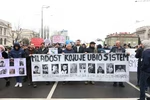Historian criticizes Serbian support for Trump, says no shift in policy towards Bosnia

Many on the far right see Donald Trump as a protector, both in Europe and beyond, but American foreign policy rarely changes drastically, said historian Milan St. Protic, who views Serbian support for Trump as political amateurism and a sign of the naivety of Serbia’s leaders.
When asked about Serbian President Aleksandar Vucic's claim that 90% of Serbian citizens supported Trump’s victory, Protic told Fonet that this was government propaganda, based on what the administration believes serves its own interests.
“I didn’t see any substantial change in Trump’s policy towards Serbia or the region during his first administration,” Protic said. He explained that while there was a shift in tone and style, the core principles of US policy towards the Balkans, established in the 1990s, remained unchanged.
On why the Serbian government places its hopes in Republican administrations and why Vucic was one of the first world leaders to congratulate Trump, Protic attributes this to a naïve approach by Serbian leaders. This pattern of political amateurism and fanfare has persisted, he noted and likely relates to Vucic’s personal satisfaction with being hosted by Trump during his first term, which Protic believes Vucic regards as a crowning achievement of his career.
Commenting on a former foreign minister's claim that Trump’s victory was Serbia’s greatest opportunity since the Cold War, Protic dismissed such grandiose statements as lacking in substance or seriousness. “I would like him to explain that statement,” Protic added, arguing that Serbia’s best chance came right after October 5, 2000, though that opportunity was ultimately squandered.
Asked if Serbia’s support for Trump put it at odds with Europe, given that only Serbia, Hungary, and partially Slovakia seemed pleased with Trump’s win, Protic acknowledged Serbia’s ongoing discord with the European Union. He stated that European political values and the systems prevailing in most EU countries are not accepted in Serbia. Serbia, he argued, leans towards authoritarianism, a sentiment that is shared by many citizens who view it as preferable to democracy.
“We, along with our current government and the head of this country, honestly do not believe in democracy. If we did, we would have it. Instead, democracy is suppressed and undermined at every step, as seen in a series of elections,” Protic said.
According to Protic, Serbia’s fundamental disagreement with Europe does not lie in differing views on Kosovo or Serbian sovereignty but rather in Serbia’s satisfaction at seeing Europe in crisis. “It serves as a reassurance that we were somehow right,” he said. This extends to Trump’s victory over Kamala Harris, and previously Hillary Clinton. “Americans made their choice, and that reflects them; they’ll have to live with it, and we’ll endure these four years somehow.”
Protic also noted the involvement of Trump’s intermediaries, who pursued not only political but also financial interests in Serbia, including close relatives and an advisor who was formerly ambassador to Germany.
When asked about the idea of Kosovo’s partition, which emerged during Trump’s first term, Protic dismissed it as unrealistic, adding that it is even less feasible now. However, he does foresee a possible outcome where any future status granted to the northern region of Kosovo vis-à-vis Pristina could set a precedent for Presevo Valley’s relationship with Belgrade. “In other words,” he clarified, “if Kosovo establishes a Community of Serb Municipalities, then it won’t be long before there’s a demand for similar status for the three Albanian-majority municipalities in southern Serbia.”
On the other hand, Protic called the hopes in Republika Srpska that Trump would assist them “banal,” reducing it to their leader’s wish to be removed from the U.S. blacklist, so he can conduct business and travel freely. While that could happen, Protic was sceptical about any U.S. shift regarding Bosnia and Herzegovina’s independence and unity, emphasizing, “That issue won’t come up in this or any future administration.”
Kakvo je tvoje mišljenje o ovome?
Učestvuj u diskusiji ili pročitaj komentare





 Srbija
Srbija
 Hrvatska
Hrvatska
 Slovenija
Slovenija



























































